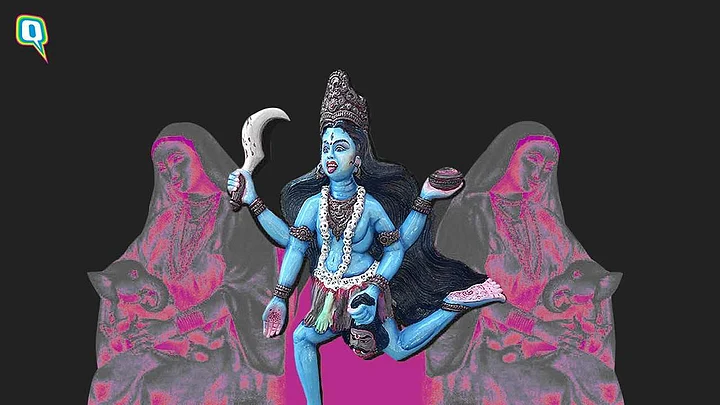I’ll start with one universal truth and one personal opinion but it is up to the reader to distinguish fact from opinion.
- Most Indian shrines are discriminatory in nature.
- Whiskey is a drink fit for divinity.
While attending the Jaipur Literature Festival this year, I ended up, unwittingly, putting the above two statements to test. Let me assure you, the results were nothing short of extraordinary.
An Unlikely Temple Run
The last thing anyone would have on their mind during the just concluded Jaipur Literature Festival is visiting a temple. The hectic eclectic schedule of the festival rarely allows for other engagements. The believers, however, say that when Shakti, the Feminine beckons, you inch closer to Her, even if you are not a devotee.
This Republic Day, I found myself standing outside the Shila Devi temple inside Amber Fort, unsure of whether I should muster the courage to enter the 17th-century shrine. To begin with, I’m a non-believer, and my temple visits are mostly meant for socio-cultural musings. I avoid entering a shrine unless appropriately attired, thanks to multiple unpleasant experiences across the world, sartorially speaking. I now have the wisdom to not go anywhere even remotely religious when dressed in a knee-baring outfit.
Yet, I stood near the temple barricade along with a bunch of devotees-comprised of both locals and travelers.
The erstwhile royal family of Jaipur has been according high veneration to the temple of Shila Devi. The idol of the goddess, a form of Durga, was brought by Raja Man Singh I of Amber from Jessore (now in Bangladesh) in 1604. According to the legend, Man Singh worshipped goddess Kali to secure a battle victory. Kali appeared in his dream and granted him his wish. Man Singh found the idol of the goddess in the sea in the form of a shila (Slab). He brought it back to Amber and got this temple constructed.
Worshipping the Goddess, Reviling the Woman
My curiosity about the temple was piqued by a conversation about it with author and my co-panelist Rajiv Kaul earlier in the day. He had told me how a slab was being worshipped as a manifestation of Shakti. Thus, while walking up to Ganesh Pol for the JLF heritage event, I debated internally if I wanted to make a quick stop at the temple for aarti. Waiting for the entry to begin, I asked one of the priests manning the barricade if I could enter the temple. I gestured towards my bare legs.
From Sabarimala to Shani Shignapur to Haji Ali and various other shrines, women have been at the receiving end of discriminatory cultural practices.
Trying to save ourselves from discrimination and humiliation almost becomes our primary nature, a necessary survival tactic. Do not go where you are not invited: the dictum sounds unfashionable and even puritanical, but it is a makeshift shield.
To my mild surprise, he said it was okay if only I removed the boots and socks. It was, indeed, encouraging but nothing prepared me for the shock and awe I was in for inside the temple.
Temple With a Difference
My trained nose caught a familiar, welcome whiff. But hey, was I delusional? It was Republic Day, after all. But maybe the devotees had their discreet happy hours before paying their respects to the goddess.
I was wrong. The devotees brought their happy-hour manna to pay respect to the goddess.
Shila Devi temple is a rare shrine where a female deity is offered alcohol, preferably whiskey.
In other temples, where this unusual prasad is offered, this honour is reserved for the male deities: Kal Bhairav or Shiva.
The Kal Bhairav temple at Ujjain and the Bhairon Mandir in Delhi have been written about, and the matters of faith and felicity there are known to many. No such references to Shila Devi temple are to be found anywhere.
Priests at this temple return the bottle of ‘prasad’ to the devotees after the goddess’s share has been taken out. The bottles small and big, cheap and expensive, desi and single-malt, tell a story of faith that transcends all barriers. All kinds of whiskey go into one vessel and what is distributed in the temple as devi’s prasad is a potent and ‘neat’ cocktail. This prasad is called pucca prasad for a reason.
I got an almost 30-ml-measure of the pucca prasad when I went closer to the deity. It burnt my throat but thrilled nevertheless. After the aarti, a different priest spotted me and asked if I had the prasad. And before I could answer, he thrust a mithai in my hands and gestured to hurry up. I was too happy to soothe my burning palate with a milky sweet. He then asked me, “bitiya, pucca prasad liya?” (Daughter, did you get the pucca prasad?) I nodded. He asked if I wanted more. Sure as hell, I did!
The next moment I was drinking the prasad from my cupped hands. The stream from an elderly priest’s lota seemed eternal. After I had drunk not less than 120 ml of that divine blend, the priest told me that prasad is meant to be imbibed in three separate sips.
I was drinking it like water from a running tap. To follow the right way, I had two more prasad sessions.
No, nobody heckled me for dakshina or made fun of my bumbling ways around the temple or even sniggered at the dress. As I exited the temple, I knew I was coming back to pay my respects to this one-of-her-own-kind goddess. This is Hinduism that everyone should be ‘high’ on.
While many authors and delegates at Ganesh Pol were getting edgy, thanks to ‘dry day’, I thanked my goddess and immersed myself in a magical dance performance by Pandit Rajendra Gangani, renowned Kathak dancer trained in the Jaipur Gharana.
